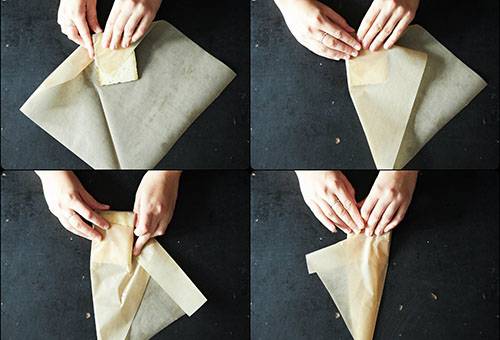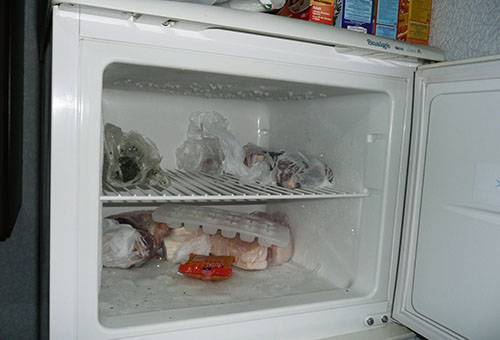How to store cheese in the refrigerator for a long time?
It would seem that cheese is used everywhere in cooking: pizzas, salads, appetizers, casseroles and even soups - and still from time to time you have to throw out a moldy piece lying in the refrigerator. Even if you love cheese and are confident that it will not go stale, you will still benefit from learning how to store cheese in the refrigerator so that you do not have to organize cheese days to dispose of almost spoiled product.

Choosing the right storage container
The science of how long to store cheese starts with what exactly to store it in to increase its lifespan. Most often, the product is sold wrapped in plastic film, but to what extent can this packaging option be considered optimal?
They say that cheese “breathes” and that it should not be tightly wrapped in an airtight material. Storing a product in film at home will not help prolong its life: such packaging is fraught with the rapid appearance of mold and, accordingly, spoilage of the product. Of course, if you are not going to store the piece for a long time, then you don’t have to replace the film with another packaging.
But if the cheese will stay in the refrigerator for several days, it is better to wrap it in baking paper or parchment paper. Perhaps you remember, in the Soviet Union it was sold exactly like this, and, apparently, for good reason. Such packaging will allow it to breathe much better than film or foil, and the piece will remain fresh and healthy longer.
But when storing cheese, it’s worth remembering that it tends to dry out and react to excess moisture, so it’s a good idea to put a piece wrapped in paper in a loose plastic zip bag. Of course, you can use a vacuum bag to extend the life of the product, but are you really going to store it for that long?
And yes, don't cut the cheese in advance unless you plan to store it in the freezer. This way the shelf life will sharply decrease, and the taste will no longer be comparable to the original.
Advice
Paper is not able to prevent the cheese from absorbing odors, so for long-term storage in the refrigerator, you can put a piece in a plastic zip bag. This will not only preserve its original smell, but will also help avoid early mold.
What if you put it in the freezer?
As we have already mentioned, cheese is a living product and its shelf life is short. Can cheese be stored in the freezer?to prolong his life? Cheese connoisseurs will probably tell you that this is a crime against taste buds, because when frozen, the product “dies”, losing the lion’s share of taste, smell and structure. So, after freezing, the cheese crumbles and acquires a “rubbery” taste.
But most cafes and pizzerias use pre-grated frozen cheese, and this does not make the served dishes any less tasty! And they probably know how to properly store cheese for as long as possible! So you can safely make preparations if you get your hands on a large amount of cheese and you don’t know where to put it. After all, the freezer is definitely better than the trash!
Advice
If we are talking about pickled soft cheeses, then, unfortunately, it is impossible to store them in the freezer.Such varieties have a short shelf life and are stored either in brine or in airtight packaging until the end of use. Over-drying such cheeses will not affect their benefits, but the taste will not be the most pleasant.
Is it possible to eat cheese if it has mold on it?
Considering the fact that when storing soft cheeses in the refrigerator, the optimal period is considered to be three days, and for hard cheeses the time increases to only seven, within a week a mold stain may form on a piece. Of course, there are many horror stories about how mold affects the human body, but the fact remains: we all consume it from time to time, simply without noticing the outbreak that is just beginning to form. This means that if the cheese, of course, is not yet half a month old and if you are not too squeamish, then you can simply cut off the moldy crust and use a piece as soon as possible, and preferably in a dish that requires heat treatment.
This life hack is not very suitable for people with very sensitive digestion, but for others, such a product is unlikely to cause food poisoning.
Advice
Early mold on cheese that has not yet technically deteriorated and has not expired can appear due to too high humidity, which is not so uncommon for the closed microclimate of a refrigeration chamber. The humidity regulator can be a piece of refined sugar or other powdery absorbent, which is placed in a bag along with the cheese so that it does not mold due to high humidity.
A few final tips
What we want to share now has little to do with storage tricks and, nevertheless, can save you from headaches.After all, it is important not only how you store cheese at home, but also whether you use it wisely.
- Love or sympathy.
Try to define your relationship with cheese and buy products accordingly. Do you know that your family eats this product every day? Then it is unlikely to have time to deteriorate - you can buy a whole wheel. Have you already figured out that sometimes you are attacked by an irresistible desire to eat a piece, but it quickly passes? Then why buy a 300 gram piece and then throw it away? Do you buy extra cheese for pizza, but never get around to the second portion? Realistically assess your strength and ask to weigh exactly as much as you can use in a short period of time, say one day, without the need for storage.
- Respect food.
Think about how much effort goes into making cheese and how many people can't afford it. It's time to start taking food more seriously, because throwing away food without thinking about how it can be saved is a real disrespect for other people, work and nature.
- Don't buy new until you use the old.
This method will help avoid spoilage of any products, especially those with a short shelf life. Your task is to look at the contents of the refrigerator, select more or less compatible products that have been there for quite a long time and will soon become candidates for discarding, and prepare an improvised dish from them. And don’t run to the store for additional goods!
Don’t complicate your life by trying to apply complex tips for storing cheese at home: it’s enough to know just a few tricks and reconsider your attitude to purchasing and cooking a little to save yourself from this headache.We hope you never need to throw away such a wonderful product as cheese again!


